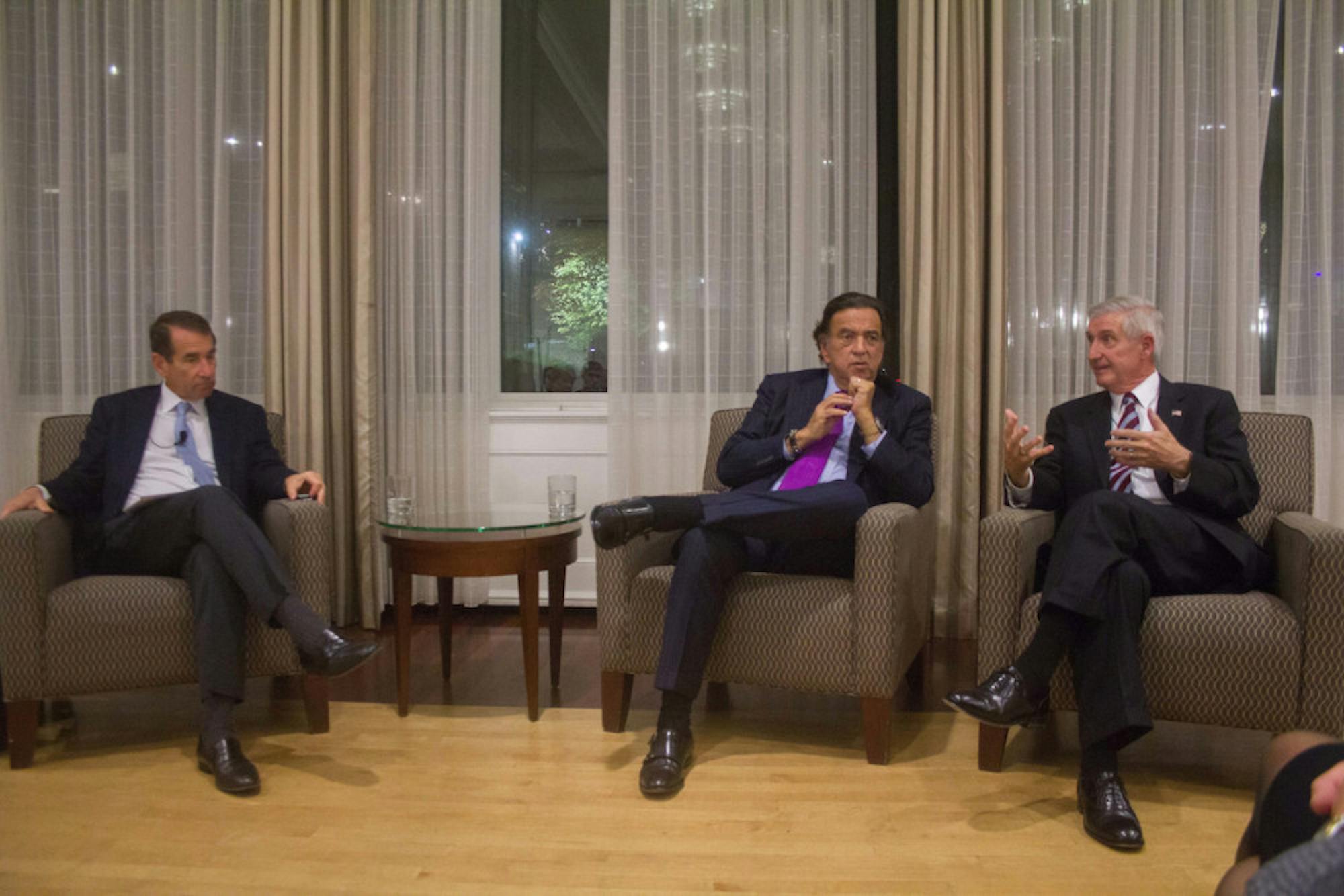The Tisch College Distinguished Speaker Series hosted a discussion last night with former New Mexico Governor Bill Richardson (LA ’70) and former Chief of Staff to President George W. Bush Andy Card, focusing on the transition of government after the election, the civic responsibilities of young voters and the speakers’ own experiences with national elections. The talk, which was held at 6 p.m. in the Alumnae Lounge, drew a full house of attendees, including Medford Mayor Stephanie Burke and former Ambassador to Belize George Bruno.
The discussion, titled “Looking Forward: What it Takes to Govern,” was moderated by Dean of the Jonathan M. Tisch College of Civic Life Alan Solomont and was sponsored by Tisch College and JumboVote.
According to Tisch College Special Projects Administrator Jessica Byrnes, the event was intended to focus on the aftermath of the election more than the election itself.
“There’s so much more at stake than who wins or loses in an election,” she told the Daily in an email. “How does our next president bring people together after such an ugly election, or build an administration that will work across party lines to create change? Our guest speakers can … help the Tufts community think about the election with a wide-angle lens.”
Card, who oversaw the transition of power from George H.W. Bush’s administration to Bill Clinton’s as well as George W. Bush’s transition into the White House, said that there are many things that the eventual president-elect must do to ensure that the transition goes smoothly, no matter who wins.
“The president should work to heal the wounds that are always there after an election,” he said. “Capitol Hill will be a difficult place to find healing, but first the president has to reach out and offer it.”
Richardson concurred, saying that the president-elect should seek to find common ground with members of both parties on issues such as income inequality, national security and infrastructure.
“The party divide has become way more divisive since my time,” he said. “Certain issues, like national security, were always non-partisan. Now, nothing is.”
Richardson also warned against voting based on vision rather than experience, a trend he says he has noticed since President Barack Obama’s 2008 campaign.
According to Card, one of the main problems with modern politics is that more radical opinions have overtaken both parties' discourse.
“When I was running for governor of Massachusetts, the rug of American politics had more rug than fringe," he said. "Today, the rug of American politics has more fringe than rug."
In an interview with the Daily before the event, Richardson, a candidate for the Democratic party’s presidential nomination in 2008, said that he has recently spoken at events that, like the Tisch talk, pair him up with a Republican speaker.
“We’re here to promote this concept of working together, which this campaign has just deteriorated,” Richardson said. “Any opportunity I have to appear in public and talk about getting things done, I take it.”
Byrnes echoed these sentiments, and said that one of the goals of the event was to present Tufts students and community members with varied perspectives.
“Tufts is a liberal campus, which is why we work hard to bring speakers to Tufts who will challenge our community to think critically,” she explained. “Especially during such a divisive election cycle, it’s so critical to get the facts and be well informed before you vote, and hearing from speakers who make us think critically about our own views and what’s at stake is one way to achieve that goal.”
Byrnes said one of the reasons Tisch College has been holding events centered around the election is to get students excited about voting.
“Students face a lot of unique barriers to voting, and it’s so important we do everything in our power to tackle them,” she wrote. “We’ve partnered closely with JumboVote at every event this fall to make sure we’re registering students, educating them on the issues and helping them get to the polls.”
In his conversation with the Daily,Card said that millennial voters in particular should seek out opinions that challenge their own in order to become more informed citizens.
“Millennials … have a social network that sometimes can trap them into groupthink," he said. "The nature of politics today is that everybody wakes up with a bias."
Richardson said that young voters also have the potential to re-introduce civility into politics.
“You’re a new electorate, and I think if we can instill a civic responsibility of working together and getting things done…there has to be civility to have a dialogue, and that’s why I’m here,” he said.
Card, despite being a self-described “staunch Republican,” told the Daily that he’s not a fan of his party’s presidential nominee, Donald Trump.
“I tend to be more inclusive than exclusive, and I’m troubled when I find candidates who are more exclusive,” he said. “So I don’t like Donald Trump because I find him to be weeding people out rather than inviting them in.”
Card added some advice for young Republicans disillusioned by Trump’s candidacy.
“Don’t abandon the responsibility of building the party. Don’t walk away,” he said. “I think it would be wrong for people, especially millennials, to choose to abandon the party when the party needs them to be engaged to better define it.”
Richardson’s advice for disillusioned young Democrats also highlighted the importance of continued political involvement rather than withdrawal.
“I would say that Sanders’ message should be listened to. The party needs to concentrate, in my view, on job growth and reducing the income inequality that exists,” he said. “But I think what is most important is that the parties come together to get something done.”






